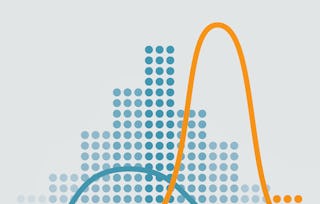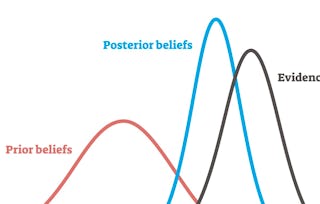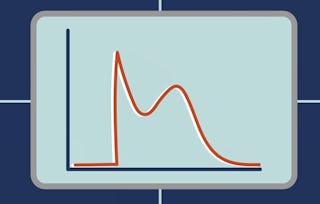This is the second of a two-course sequence introducing the fundamentals of Bayesian statistics. It builds on the course Bayesian Statistics: From Concept to Data Analysis, which introduces Bayesian methods through use of simple conjugate models. Real-world data often require more sophisticated models to reach realistic conclusions. This course aims to expand our “Bayesian toolbox” with more general models, and computational techniques to fit them. In particular, we will introduce Markov chain Monte Carlo (MCMC) methods, which allow sampling from posterior distributions that have no analytical solution. We will use the open-source, freely available software R (some experience is assumed, e.g., completing the previous course in R) and JAGS (no experience required). We will learn how to construct, fit, assess, and compare Bayesian statistical models to answer scientific questions involving continuous, binary, and count data. This course combines lecture videos, computer demonstrations, readings, exercises, and discussion boards to create an active learning experience. The lectures provide some of the basic mathematical development, explanations of the statistical modeling process, and a few basic modeling techniques commonly used by statisticians. Computer demonstrations provide concrete, practical walkthroughs. Completion of this course will give you access to a wide range of Bayesian analytical tools, customizable to your data.

Bayesian Statistics: Techniques and Models

Bayesian Statistics: Techniques and Models
This course is part of Bayesian Statistics Specialization

Instructor: Matthew Heiner
Top Instructor
58,035 already enrolled
Included with
495 reviews
What you'll learn
Efficiently and effectively communicate the results of data analysis.
Use statistical modeling results to draw scientific conclusions.
Extend basic statistical models to account for correlated observations using hierarchical models.
Skills you'll gain
Details to know

Add to your LinkedIn profile
See how employees at top companies are mastering in-demand skills

Build your subject-matter expertise
- Learn new concepts from industry experts
- Gain a foundational understanding of a subject or tool
- Develop job-relevant skills with hands-on projects
- Earn a shareable career certificate

There are 5 modules in this course
Statistical modeling, Bayesian modeling, Monte Carlo estimation
What's included
11 videos4 readings4 assignments1 discussion prompt
Metropolis-Hastings, Gibbs sampling, assessing convergence
What's included
11 videos7 readings4 assignments
Linear regression, ANOVA, logistic regression, multiple factor ANOVA
What's included
11 videos5 readings5 assignments1 discussion prompt
Poisson regression, hierarchical modeling
What's included
10 videos7 readings4 assignments1 discussion prompt
Peer-reviewed data analysis project
What's included
1 video1 reading1 peer review
Earn a career certificate
Add this credential to your LinkedIn profile, resume, or CV. Share it on social media and in your performance review.
Instructor

Offered by
Explore more from Probability and Statistics
 Status: Free Trial
Status: Free TrialUniversity of California, Santa Cruz

Duke University
 Status: Free Trial
Status: Free TrialArizona State University
 Status: Free Trial
Status: Free TrialUniversity of California, Santa Cruz
Why people choose Coursera for their career

Felipe M.

Jennifer J.

Larry W.

Chaitanya A.
Learner reviews
- 5 stars
83.03%
- 4 stars
12.92%
- 3 stars
2.02%
- 2 stars
1.01%
- 1 star
1.01%
Showing 3 of 495
Reviewed on Aug 31, 2020
One of the best practical math courses present in coursera. Loved the course and will surely look upto the next course eagerly.
Reviewed on Nov 16, 2019
One of the best designed courses. The material and videos are very precise and informative. The quiz questions and assignment are very enjoyable. Thank you !
Reviewed on Nov 30, 2024
Very good instructor, knowledgeable and thorough, touching the right level of details with big picture in mind, and providing practical guide for hands-on Bayesian data analysis.

Open new doors with Coursera Plus
Unlimited access to 10,000+ world-class courses, hands-on projects, and job-ready certificate programs - all included in your subscription
Advance your career with an online degree
Earn a degree from world-class universities - 100% online
Join over 3,400 global companies that choose Coursera for Business
Upskill your employees to excel in the digital economy
Frequently asked questions
To access the course materials, assignments and to earn a Certificate, you will need to purchase the Certificate experience when you enroll in a course. You can try a Free Trial instead, or apply for Financial Aid. The course may offer 'Full Course, No Certificate' instead. This option lets you see all course materials, submit required assessments, and get a final grade. This also means that you will not be able to purchase a Certificate experience.
When you enroll in the course, you get access to all of the courses in the Specialization, and you earn a certificate when you complete the work. Your electronic Certificate will be added to your Accomplishments page - from there, you can print your Certificate or add it to your LinkedIn profile.
Yes. In select learning programs, you can apply for financial aid or a scholarship if you can’t afford the enrollment fee. If fin aid or scholarship is available for your learning program selection, you’ll find a link to apply on the description page.
More questions
Financial aid available,
¹ Some assignments in this course are AI-graded. For these assignments, your data will be used in accordance with Coursera's Privacy Notice.

